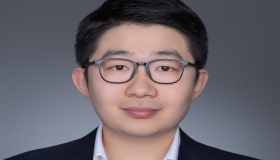Academic Seminar | City Intelligence for Intelligent Living--by Prof. Oliver Gao
Dear all,
You are cordially invited to the seminar to be delivered by Prof. Oliver GAO of Cornell University from 16:30 to 17:30 on Thursday, June 21, 2018 at Boardroom, Daoyuan Building.
City Intelligence for Intelligent Living
From Transportation to Air Pollution and Public Health—Are We Doing the Right Thing, and Doing it Right?
H. Oliver Gao, hg55@cornell.edu
Systems Engineering
Center for Transportation, Environment and Community Health (CTECH)
Cornell University
Transportation-related air pollution, GHG emissions and energy problems are a significant issue in the U.S., China, and across the world. The World Health Organization estimates that urban air pollution causes 200,000 deaths per year worldwide and that it will be responsible for 8 million premature deaths from 2000 to 2020. Sacrificing environmental quality and planetary health for transportation is simply infeasible. How do we meet the transportation needs in the age of development without sacrificing environment and energy sustainability?
The rise of autonomous technologies, shared-use mobility services and Advanced Travelers’ Information Systems (ATIS, e.g., Google Map) has the potential to severely disrupt existing products and services in the urban mobility space. Autonomous and connected vehicles may very well be on our streets and highways by the end of the decade. Peer-to-peer mobility services like Uber and Didi have challenged the taxi, livery, car share, and mass-transit establishment. Disruptive mobility of this nature has the power to not only redefine industries, but to reshape infrastructure systems as well: these new technologies and novel services have the power to dramatically change the way in which transportation infrastructure systems operate. A coordinated mobility system is deeply connected to and will have profound impacts on all types of infrastructure and the living environment such as urban air quality and public health.

Gao’s research and teaching focus on the nexus of transportation, environment, and health systems. The overarching goal of his research predicates on a multi-disciplinary system-driven approach to novel basic research, applied research and policy discoveries that will advance the understanding of the transportation-air quality-public health nexuses, where the lack of science and knowledge is the biggest barrier to sustainable mobility, air quality and health. In this talk Dr. Gao takes a phased approach looking into the depth and their inter-relationships of the following topics that span across transportation, air quality, and public health: mathematical modeling in search for cost-effective environment abatement strategies in green fleet management; transportation emission and the ozone weekend effects emphasizing the nonlinear atmospheric system and the need to integrate transportation and air quality modeling; systems modeling tools for impact assessment of future mobility innovations on PM2.5 pollution and health costs in NYC, and mechanism design for public-private partnership for future city infrastructure and intelligence. If time allows, he will briefly talk about the Cornell Systems Engineering, and the Center for Transportation, Environment, and Community Health (CTECH) that he directs.
BIOGRAPHY
Biography: Dr. Gao, Director of Cornell Systems Engineering and Director of Center for Transportation, Environment, and Community Health (CTECH), is a Full Professor with the School of Civil and Environmental Engineering at Cornell University. He is an elected member in the graduate fields of 1) Civil and Environmental Engineering, 2) Air Quality in Earth and Atmospheric Science, 3) Cornell Institute of Public Affairs (CIPA), and 4) Systems Engineering at Cornell University. His research focuses on quantitative modeling and development of engineering systems solutions for sustainable and intelligent infrastructure and lifeline systems, low carbon and low emission transportation systems, and the closely related environment (especially air quality and climate change)-energy systems. He also studies alternative transportation/energy technologies, systems innovation, and green supply chain and logistics (e.g., sustainable food systems, quantifying and mitigating green-house gas emissions from food supply chains). He is a member of Transportation Research Board Committee on Transportation and Air Quality (ADC20), an academic member on the Federal Advisory Committee of US EPA MOVES model development, a member of Transportation Research Board Committee on Maintenance Equipment (AHD60), and a member of the Cornell Atkinson Center for a Sustainable Future (ACSF). Gao received his graduate degrees (Ph.D. in Civil and Environmental Engineering, M.S. in Statistics, and M.S. in Agriculture and Resource Economics) from the University of California at Davis in 2004, M.S. degree in Civil Engineering in 1999, and duel undergraduate degrees in Environmental Science and Civil Engineering in 1996 from Tsinghua University, China. He recently stepped down from the Editor-in-Chief post of Transportation Research Part D: Transport and Environment. Before joining Cornell, Gao was a QUANT in the mathematical and econometrical modeling division at the Rohatyn Group, LLG, a Wall Street hedge fund specializing in emerging markets including the BRIC countries.




